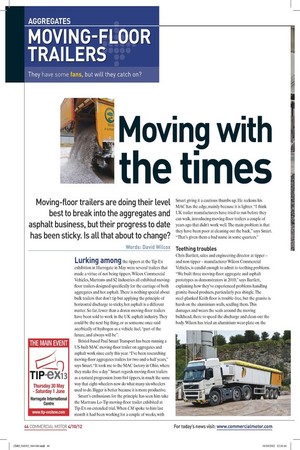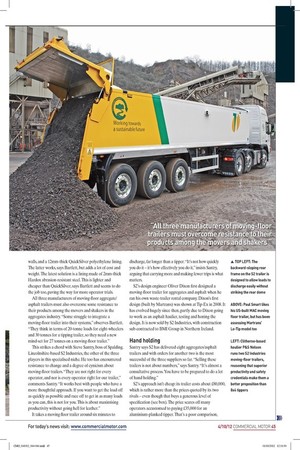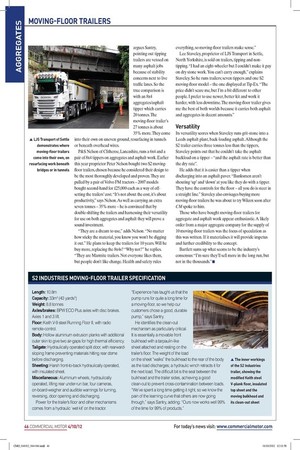Moving with
Page 35

Page 36

Page 37

If you've noticed an error in this article please click here to report it so we can fix it.
the times
Moving-floor trailers are doing their level best to break into the aggregates and asphalt business, but their progress to date has been sticky. Is all that about to change?
Words: David Wilcox Lurking among the tippers at the Tip-Ex exhibition in Harrogate in May were several trailers that made a virtue of not being tippers. Wilcox Commercial Vehicles, Martrans and S2 Industries all exhibited movingfloor trailers designed specifically for the carriage of both aggregates and hot asphalt. There is nothing special about bulk trailers that don’t tip but applying the principle of horizontal discharge to sticky, hot asphalt is a different matter. So far, fewer than a dozen moving-floor trailers have been sold to work in the UK asphalt industry. They could be the next big thing, or as someone once said acerbically of hydrogen as a vehicle fuel, “part of the future, and always will be” .
Bristol-based Paul Smart Transport has been running a US-built MAC moving-floor trailer on aggregates and asphalt work since early this year. “I’ve been researching moving-floor aggregates trailers for two-and-a-half years,” says Smart. “It took me to the MAC factory in Ohio, where they make five a day.” Smart regards moving-floor trailers as a natural progression from 8x4 tippers, in much the same way that eight-wheelers now do what many six-wheelers used to do. Bigger is better because it is more productive.
Smart’s enthusiasm for the principle has seen him take the Martrans Lo-Tip moving-floor trailer exhibited at Tip-Ex on extended trial. When CM spoke to him last month it had been working for a couple of weeks, with Smart giving it a cautious thumbs up. He reckons his MAC has the edge, mainly because it is lighter. “I think UK trailer manufacturers have tried to run before they can walk, introducing moving-floor trailers a couple of years ago that didn’t work well. The main problem is that they have been poor at cleaning out the back,” says Smart. “That’s given them a bad name in some quarters.”
Teething troubles
Chris Bartlett, sales and engineering director at tipper – and non-tipper – manufacturer Wilcox Commercial Vehicles, is candid enough to admit to teething problems. “We built three moving-floor aggregate and asphalt prototypes as demonstrators in 2010,” says Bartlett, explaining how they’ve experienced problems handling granite-based products, particularly pea shingle. The steel-planked Keith floor is trouble-free, but the granite is harsh on the aluminium walls, scuffing them. This damages and wears the seals around the moving bulkhead, there to speed the discharge and clean-out the body. Wilcox has tried an aluminium wear-plate on the walls, and a 12mm-thick QuickSilver polyethylene lining. The latter works, says Bartlett, but adds a lot of cost and weight. The latest solution is a lining made of 2mm-thick Hardox abrasion-resistant steel. This is lighter and cheaper than QuickSilver, says Bartlett and seems to do the job too, paving the way for more operator trials.
All three manufacturers of moving-floor aggregate/ asphalt trailers must also overcome some resistance to their products among the movers and shakers in the aggregates industry. “Some struggle to integrate a moving-floor trailer into their systems,” observes Bartlett. “They think in terms of 20-tonne loads for eight-wheelers and 30 tonnes for a tipping trailer, so they need a new mind-set for 27 tonnes on a moving-floor trailer.” This strikes a chord with Steve Santry, boss of Spalding, Lincolnshire-based S2 Industries, the other of the three players in this specialised niche. He too has encountered resistance to change and a degree of cynicism about moving-floor trailers. “They are not right for every operator, and nor is every operator right for our trailer,” comments Santry. “It works best with people who have a more thoughtful approach. If you want to get the load off as quickly as possible and race off to get in as many loads as you can, this is not for you. This is about maximising productivity without going hell for leather.” It takes a moving floor trailer around six minutes to discharge, far longer than a tipper. “It’s not how quickly you do it – it’s how effectively you do it,” insists Santry, arguing that carrying more and making fewer trips is what matters.
S2’s design engineer Oliver Dixon first designed a moving-floor trailer for aggregates and asphalt when he ran his own waste-trailer rental company. Dixon’s first design (built by Martrans) was shown at Tip-Ex in 2008. It has evolved hugely since then, partly due to Dixon going to work as an asphalt haulier, testing and honing the design. It is now sold by S2 Industries, with construction sub-contracted to BMI Group in Northern Ireland.
Hand holding
Santry says S2 has delivered eight aggregates/asphalt trailers and with orders for another two is the most successful of the three suppliers so far. “Selling these trailers is not about numbers,” says Santry. “It’s almost a consultative process. You have to be prepared to do a lot of hand holding.” S2’s approach isn’t cheap: its trailer costs about £80,000, which is rather more than the prices quoted by its two rivals – even though that buys a generous level of specification (see box). The price scares off many operators accustomed to paying £35,000 for an aluminium-planked tipper. That’s a poor comparison, argues Santry, pointing out tipping trailers are vetoed on many asphalt jobs because of stability concerns next to live traffic lanes. So the true comparison is with an 8x4 aggregates/asphalt tipper which carries 20 tonnes. The moving-floor trailer’s 27 tonnes is about 35% more. They come into their own on uneven ground, resurfacing in tunnels or beneath overhead wires.
P&S Nelson of Clitheroe, Lancashire, runs a 6x4 and a pair of 8x4 tippers on aggregates and asphalt work. Earlier this year proprietor Peter Nelson bought two S2 movingfloor trailers, chosen because he considered their design to be the most thoroughly developed and proven. They are pulled by a pair of Volvo FM tractors – 2007 models bought second-hand for £25,000 each as a way of offsetting the trailers’ cost. “It’s not about the cost, it’s about productivity,” says Nelson. As well as carrying an extra seven tonnes – 35% more – he is convinced that by double-shifting the trailers and harnessing their versatility for use on both aggregates and asphalt they will prove a sound investment.
“They are a dream to use,” adds Nelson. “No matter how sticky the material, you know you won’t be digging it out.” He plans to keep the trailers for 10 years. Will he buy more, replacing the 8x4s? “Why not?” he replies. “They are Marmite trailers. Not everyone likes them, but people don’t like change. Health and safety rules everything, so moving-floor trailers make sense.” Lee Staveley, proprietor of LJS Transport in Settle, North Yorkshire, is sold on trailers, tipping and nontipping. “I had an eight-wheeler but I couldn’t make it pay on dry stone work. You can’t carry enough,” explains Staveley. So he runs trailers; seven tippers and one S2 moving-floor model – the one displayed at Tip-Ex. “The price didn’t scare me, but I’m a bit different to other people. I prefer to use newer, better kit and work it harder, with less downtime. The moving-floor trailer gives me the best of both worlds because it carries both asphalt and aggregates in decent amounts.”
Versatility
Its versatility scores when Staveley runs grit-stone into a Leeds asphalt plant, back-loading asphalt. Although the S2 trailer carries three tonnes less than the tippers, Staveley points out that he couldn’t take the asphalt backload on a tipper – “and the asphalt rate is better than the dry rate” .
He adds that it is easier than a tipper when discharging into an asphalt paver. “Banksmen aren’t shouting ‘up’ and ‘down’ at you like they do with a tipper. They have the controls for the floor – all you do is steer in a straight line.” Staveley also envisages buying more moving-floor trailers: he was about to try Wilcox soon after CM spoke to him.
Those who have bought moving-floor trailers for aggregate and asphalt work appear enthusiastic. A likely order from a major aggregate company for the supply of 10 moving-floor trailers was the focus of speculation as this was written. If it materialises it will provide impetus and further credibility to the concept.
Bartlett sums up what seems to be the industry’s consensus: “I’m sure they’ll sell more in the long run, but not in the thousands.” n










































